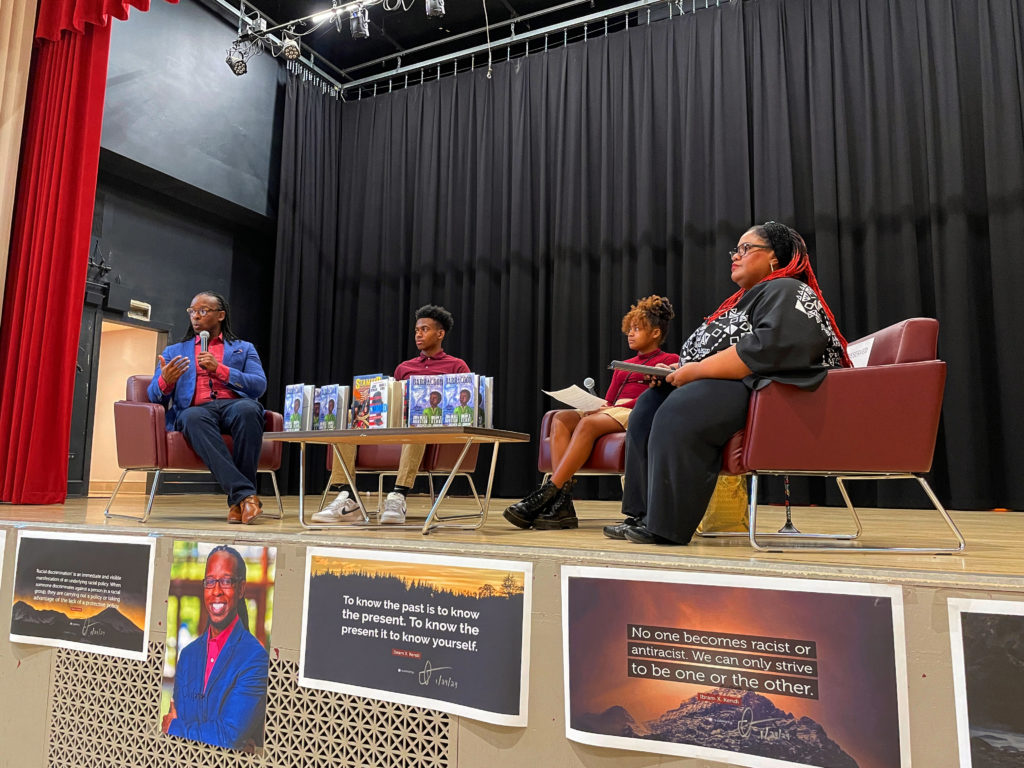
Dr. Ibram X. Kendi, Jidé George, Sanaa Wilson, and Kimberly-Celeste “K.C.” Boyd. Courtesy of the Author.
By Matthew Koehler
In January, Jefferson Middle School Academy welcomed guest author Dr. Ibram X. Kendi. Kendi’s new book, Barracoon: Adapted for Young Readers, tells the story of Oluale Kossola, who was a survivor of the last recorded slave ship that arrived illegally on American shores.
Joining Kendi on stage were 8th graders Sanaa Wilson and Jidé George and Jefferson librarian Kimberly-Celeste “K.C.” Boyd. “When the opportunity was presented to us by An Open Book Foundation to have Dr. Kendi visit Jefferson Academy, I was thrilled,” Boyd said.
The event was a collaboration between An Open Book foundation and Harper Collins. Over the course of a half hour, panelists and students in attendance grilled Kendi on his love of reading and topics like racism, history, and truth telling.
Kendi said he wasn’t into reading when he was younger because the books put in front of him were boring. It wasn’t until he took a Black history class in college where he discovered his love of reading because it allowed him to better understand things that were happening to him as a Black man.
Boyd mentioned that Jefferson students love reading, and that last year, some 10,000 books circulated through the library amongst only 400 students.
“It’s really our job as authors, and certainly the job of librarians, to curate and find those books that interest us,” Kendi said.
Kendi said the inspiration for his writing comes from what has happened to him and other Black Americans, including the deaths of Tamir Rice and Trayvon Martin.
“Witnessing Black young people, and older people, being killed by the police, and even vigilantes, and having those police get away with it, and hearing those police say they feared for their lives, and people believing that…pushed me to explain what’s going on.”
To fight against harmful stereotypes and racism, Kendi said it’s important for Black people, especially young Black people, to understand racist ideas.
“When we talk about Black people as being lazy or dangerous, those are racist ideas. Black people today are taught that they should be in poverty. That they should not be in that job. That they should be disrespectful. That they should be harmed by the police because there’s something wrong with them. And that causes them, when they internalize those ideas, that they should not resist,” he added.
However, these ideas are somewhat controversial – not necessarily because they are untrue but because they challenge narratives about race in America. Recently, many states have pushed legislation to ban books, including Kendi’s How to Be an Antiracist.
Despite the bans and a culture of fear around being canceled, Kendi said it’s important to tell the truth and be able to back up your claims.
“The way you learn about what the truth is is through research. And the whole purpose of research is getting evidence – evidence that substantiates or demonstrates the truth. So for me as a scholar, I don’t write anything that I can’t substantiate. That I don’t have evidence to support it. And in order to acquire that evidence, I research,” Kendi said.

